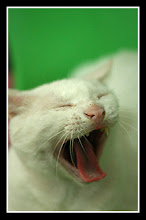Now down to the third book of 'The Hunger Games' trilogy by Suzanne Collins. Started the series shortly before the holidays, and it edged out the two other books I was reading then.
To say that the story is gripping seems tired, but that's exactly what it is. It has totally gripped my attention, and I'm normally an attention-deficit reader. What exactly do I like about it? Let me explain in 3 subheads (spoiler alert!).
Likable heroine
Katniss is the 16yr-old from whose POV the story is told. Named after an edible tuber, she struggles with self-doubt and a complicated love life, just like any normal teenager. But that's the only thing normal about her. The rest of her is, well, heroine material.
She's a hardened hunter who feels most at home in the wilderness, and she can be deadly with her weapon of choice--the bow-and-arrow. She not only survived two Hunger Games, she was also able to defy the puppeteers behind these, and eventually subvert an oppressive system that had been entrenched for 75yrs.
But of course these are only obvious to the reader. As far as Katniss is concerned, she is just a girl from an impoverished district who will do whatever it takes to keep her family and friends alive. Hunting in the woods, and selling meat in the black market, are punishable crimes where she lives, but those are the only means she knows to feed her family. Her special skills were learned the hard way, as she struggled to keep herself and her family alive. It wasn't because she had a choice.
But in the end, what makes her a likable heroine is her sensitivity to people's suffering. Her actions are triggered by compassion. She has an impulsive tendency to aid people who, like her, suffer cruelty in the hands of the same oppressors. I'm not sure the allusion to Robin Hood is deliberate, but the bow-and-arrow, the rebellious streak and the pro-poor sentiments are hard to miss.
Riveting plot
Set in post-apocalyptic North America. Now there is one country, called Panem, composed of the Capitol, where the seat of power is, and 13 districts. Except for 13, all the districts provide everything the Capitol needs--food, garments, electronics, fuel, even soldiers.
Most of the story is about a fictional reality TV show called 'The Hunger Games,' where children from the 12 districts are forced to kill one another until only one remains. The participants, called tributes, are drawn randomly every year. They are called tributes because they are in effect sacrificed on the altar of the Capitol, as a reminder of their defeat in a revolution 75yrs before that led to the isolation of 13.
The story is both a critique and a frank portrayal of the power of media. It shows how, even in reality TV, everything is contrived, including the celebrity's image. But this image, usually the handiwork of brilliant stylists, has the potential to sway people's opinion, and even spark a revolution.
Lots of action!
'The Hunger Games' is reality TV taken to extreme. It happens in an era when viewer's appetite for violent entertainment can no longer be satisfied by make-believe. They have to see not just actual blood and gore, but children--some barely into their teens--going at it. Ironically, it reminded me of gladiators who killed one another in the arena for the entertainment of Roman citizens. Is it saying that post-apocalyptic humanity will regress to the brutality of ancient civilizations?
Anyway, in the Games, the arena is designed carefully so it can kill the tributes creatively, if they don't fall in each other's hands first. There are booby traps, killer wildlife, poisonous fruits, and extreme weather disturbances. The tributes can also die from thirst and hunger if they don't know how to source food and water within the arena.
The best part of the story, in my opinion, is where we follow Katniss in the arena. We feel her thirst, fatigue, paranoia, fear, hatred, even the physical pain of her injuries. We see how her survival is a result of both her own attributes--strength, hunting skills, resourcefulness, and intuition--and her alliance with the other tributes. The latter can be partly attributed to luck, because she is no sunny personality, and making friends is not her strongest suit.
Overall, I like how the spartan life in the districts, particularly in 12 where Katniss lived, is juxtaposed against the opulence of the Capitol. It's not just in the availability and variety of food, or even in their taste in entertainment, but in people's mindset as well. We see the difference in how people in the districts and those in the Capitol reacted to the war.
We see Katniss' styling team, who are portrayed as overly concerned with trivial matters, such as beauty and fashion. Katniss defended them, saying how they are is not their fault, and that they're essentially just children themselves. I'm betting this is a critique directed at citizens of certain counties, where the abundance of resources made people soft and shallow, and removed from the suffering of the majority of humanity. But soft and shallow people tend to think hunger and oppression can happen only in movies, or in fictional countries like Panem. I'm not sure the message will hit home.
Postscript:
I was almost done with 'Mockingjay' when I realized the last page was missing. I went back to the bookstore to have my book replaced, but they didn't have a ready copy then. They said they'd call within the week. Here's crossing my fingers.
Subscribe to:
Post Comments (Atom)

No comments:
Post a Comment